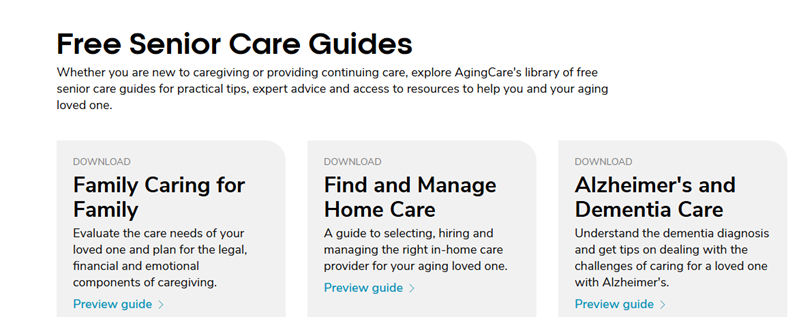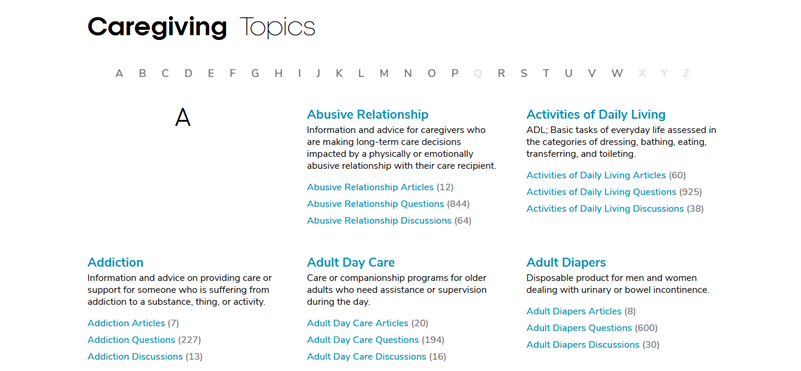
Caregiving isn’t just a difficult role. It can also be complex, confusing, and isolating. That’s why you need a collection of tools and resources at your fingertips.
A particularly interesting resource is a site called AgingCare.
The homepage of the site focuses on helping you find in-home care, assisted living, and caregiver support. They use an assessment to help connect you with the most relevant services in your area, which can save you considerable time and energy.
This is a free service, so it’s worth experimenting with. However, it’s not what we’re most interested in today. Here, we’re digging into the resource side of the site, including their Care Guides, Articles, Questions, and Discussions.
AgingCare Care Guides

First, AgingCare hosts various free guides, including:
- Family Caring for Family
- Find and Manage Home Care
- Alzheimer’s and Dementia Care
- Guide to Veteran’s Benefits
- Guide to Senior Housing
- Creating a Care Plan
- Senior Housing Planner
These are all eBooks, and decent ones at that.
For example, the Alzheimer’s and Dementia Care book is close to 100 pages long, with links to many important resources plus detained information about different aspects of Alzheimer’s Care. Chapters in the book include Dealing with the Challenges of Alzheimer’s, Handling Family Interactions, Finding Professional Alzheimer’s Care, and more.
The topics are all comprehensive, so you won’t find all your answers in a single eBook. It’s better to see the books as overviews, ones that give you insights into the topic at hand and help you see where to begin.
Caregiving Topics

Along with the Guides, AgingCare has a section of the site called Caregiving Topics, which is huge. The section is an A to Z of key caregiving topics, including examples like:
- Abusive Relationship
- Addiction
- Adult Day Care
- Care Decisions
- Cognitive Decline
- Communication & Language
- Palliative Care
That’s just a small selection. There are many other topics on the list as well.
For each topic, there are generally links to Articles, Questions, and Discussions. For example, the Poor Hygiene topic currently links to 12 Articles, 484 Questions, and 17 Discussions.
Articles
The Articles listed in Caregiving Topics are similar to an article you might find on a blog, providing detailed information on a particular topic. For example, for the Poor Hygiene topic, some of the articles include:
- The Truth About “Old People Smell”
- How to Persuade a Senior to Put on Clean Clothes
- 6 Caregiver Tips for Convincing a Senior to Bathe
- Incontinence Care Tips: How to Eliminate Stains and Odors
Users can leave comments under the articles, so you get to see what other people think about the topics.
There are links to other questions too, including Recent Questions and Popular Questions. These questions provide insight into the various topics that are being discussed on the site. You can easily jump from one to the other, as most have similar links at the end.
Questions and Discussions
In theory, the Questions section of the site focuses on specific questions that caregivers have, while Discussions allow for more open-ended discussion of a situation and potential solutions. In practice, the two sections are used in roughly the same way.
Often, a site member will ask a question and then provide additional details about their situation. Forum members can then weigh in, often offering perspectives and advice for the situation at hand.
Other times, the discussion might simply be a chance for each member to vent or share stories.
Benefits of the AgingCare
I find myself returning to AgingCare regularly. The site truly is a wealth of information. It’s also one of the few places where you get perspectives from experts and caregivers at the same time.
What I love most is the honesty. Caregivers on the site often talk about the not-so-pretty sides of caregiving, including when seniors are abusive, any sense of resentment or anger, and dealing with midnight incontinence messes.
The site also gives you the chance to talk to real caregivers. That means you’re getting advice and support from people who actually know what you’re experiencing. That’s powerful – especially if you don’t have much in-person support.
You don’t even need to ask questions yourself. You can often find the answers you need by simply reading discussions on the site.
A final cool thing is that site members aren’t afraid to say the hard things when they need to.
I’ve seen multiple cases where forum members have highlighted patterns of enabling or when caregivers are acting as martyrs. While it’s never fun to receive such criticism, the information can be crucial for improving the balance in your life.
Limitations of AgingCare
The features of AgingCare make it helpful for most caregivers. Where else do you find such a wealth of knowledge combined with social support and answers for your questions?
But, there are some big limitations to consider.
First – most of the advice comes from individual caregivers. Only the articles and guides are written by expects. Even here, it isn’t always clear how qualified they are.
As a result, the quality of advice varies dramatically.
This is most noticeable in the discussion threads, as there can be multiple contradictory perspectives within a single post. While there’s certainly some great advice, other caregivers are simply speaking from their own biases and emotional responses.
You may need to sift through the responses to find ones that are actually relevant and helpful. This becomes trickier when there isn’t a single correct answer or when threads are very busy.
Members sometimes get into debates too, making the threads even longer.
This highlights one of the biggest challenges of the site – there’s an insane amount of information. You can easily get lost bouncing from one thread to another. You might learn some useful information in the process or you might not.
I’ve had a decent amount of luck and found information most of the time. But, caregivers with very specific questions might have more difficulty.
My AgingCare Review
I do like the AgingCare site, especially as most of the services are free. It is a fantastic hub for information and the members appear to be active and engaged.
The site doesn’t take the place of interacting with others in person, but it could still be a way to make caregiving a less isolating process.
At the end of the day, AgingCare isn’t going to be a source of medical and expert advice – nor is it designed to be. Instead, it is a powerful chance to get advice and guidance from people who are going through similar experiences themselves.
After all, they’ve been there. They’ve learned to find creative solutions to the darndest problems and ways to cope with the unexpected.
Feeling Overwhelmed?
Check out our Caregiving Consulting service for personalized support and guidance.

Caregiving is not an easy and simple job. While the main responsibility of caregivers is to provide care to people, particularly to those who are sick and of old ages, caregivers also need to take care of themselves and to spend some time doing things outside of their duty. More often than not, caregivers need to juggle lots of different things at once (e.g. running errands, doing housework, and more) in order to fulfill their obligation. This often leaves them tired and drained, which if constantly disregarded, can lead to caregiver burnout.